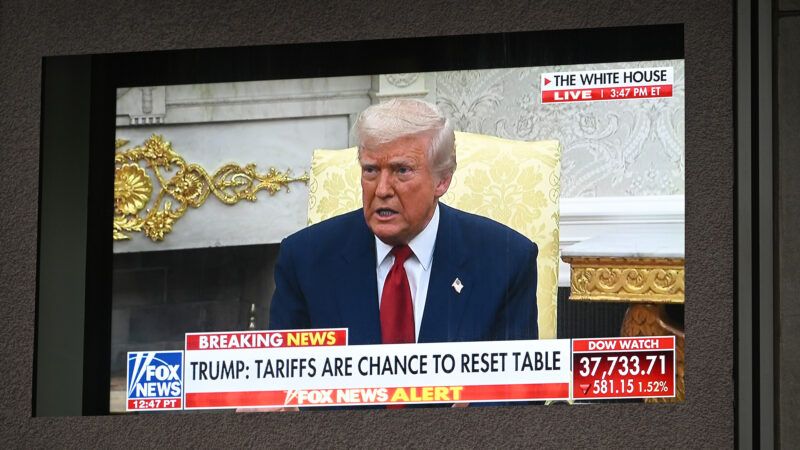IMF Report: Trump Trade War Will Hurt Both U.S. and Global Economies
Predictions for U.S. and global economic growth are down since January.

Since his second term began, President Donald Trump has imposed double-digit tariffs on nearly every nation, sending markets into turmoil. Trump said it was necessary, posting in all caps on Truth Social, "Will there be some pain? Yes, maybe (and maybe not!)." But "it will all be worth the price that must be paid."
In a new report this week, the International Monetary Fund (IMF) found Trump's trade war would negatively affect both the U.S. and global economies.
"Following an unprecedented series of shocks in the preceding years, global growth was stable yet underwhelming through 2024 and was projected to remain so in the January 2025 World Economic Outlook (WEO) Update," the IMF wrote in the executive summary of the April 2025 WEO report. "However, the landscape has changed as governments around the world reorder policy priorities."
It did not mince words assigning blame. "A series of new tariff measures by the United States and countermeasures by its trading partners have been announced and implemented, ending up in near-universal US tariffs on April 2 and bringing effective tariff rates to levels not seen in a century. This on its own is a major negative shock to growth," not to mention "the unpredictability with which these measures have been unfolding."
In short, the IMF found, "the swift escalation of trade tensions and extremely high levels of policy uncertainty are expected to have a significant impact on global economic activity."
To the extent the report could make a prediction, it was rather negative: "Global growth is projected to drop to 2.8 percent in 2025 and 3 percent in 2026." As recently as January, the WEO had predicted 3.3 percent growth each year; the change constitutes "a cumulative downgrade of 0.8 percentage point, and much below the historical (2000–19) average of 3.7 percent."
The prognosis for the U.S. was even worse: "Growth in the United States is expected to slow to 1.8 percent, a pace that is 0.9 percentage point lower" than the prediction in January, it found. "The downward revision is a result of greater policy uncertainty, trade tensions, and a softer demand outlook, given slower-than-anticipated consumption growth. Tariffs are also expected to weigh on growth in 2026, which is projected at 1.7 percent amid moderate private consumption."
The report put the odds the U.S. would experience a recession this year at 37 percent—up from 25 percent odds in October 2024.
Economic growth will likely be lower than expected as a result of Trump's tariffs and restrictionist trade policy. Inflation is likely to get worse as well—both here and abroad.
"For advanced economies, the inflation forecast for 2025 has been revised upward by 0.4 percentage point since January," the report notes. Compared to the January 2025 prediction, the U.S. "inflation forecast has been revised upward…by 1.0 percentage point….This reflects stubborn price dynamics in the services sector as well as a recent uptick in the growth of the price of core goods (excluding food and energy) and the supply shock from recent tariffs."
It predicted the U.S. inflation rate would rise to 3 percent by the end of the year, but put the odds that it would "rise above 3.5 percent" at "more than 30 percent, compared with 13 percent back in October." The annualized inflation rate hit 3 percent in January but declined in the following two months.
Last week, Federal Reserve Chair Jerome Powell said there was a "strong likelihood" Trump's tariffs would cause prices and unemployment to rise in a manner that would be difficult for the Fed to address without exacerbating one problem or the other.
The IMF's chief economist warned in October that tariff increases like then-candidate Trump floated were "a policy that is harming basically everyone."
"Trump's plan to lower prices will be impeded by his support of broad-based tariffs on consumer goods and manufacturing inputs," Reason's Jack Nicastro wrote in January, the day after Trump's inauguration.
Trump owes his victory in November in large part to consumer dissatisfaction with the persistently high levels of inflation during Joe Biden's presidency, and he explicitly campaigned on lowering prices. "I will immediately bring prices down, starting on day one," he pledged in August 2024.
Now, Trump's tariffs are making things more expensive and making Americans poorer—and will have negative effects across the entire world.
